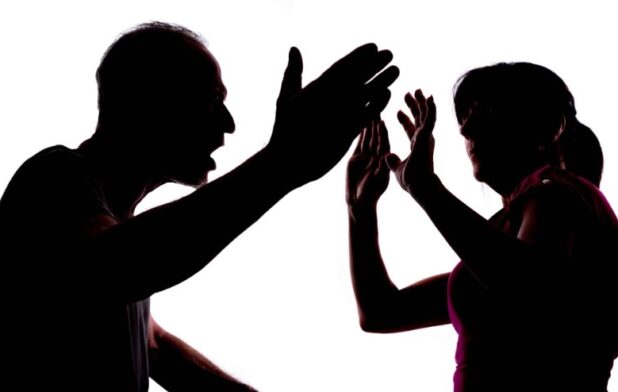Under any law, you will not find crimes that are specifically classified as domestic crimes. Whatever the crime may be, whether violence or assault, if it takes place in a domestic environment, then you can call it a domestic violation. In most cases, the person against whom the crime is committed is the alleged person’s partner, companion, child or family member.
If you ever find yourself falsely accused of domestic abuse, you should know your rights and contact a competent attorney. Remember that the charges will be considered as an assault on the victim in the cases of hitting, stabbing, kicking or punching, threatening, or throwing objects.
In short, any sort of action that could or did harm the victim in any way is considered a domestic offense. Most federal and provincial institutes have declared it a crime of no tolerance. This is why the police work on cases of domestic violence with great vigor.
Table of Contents
What You Should Know About Domestic Violence

Domestic violence is a serious crime and that is why it should be investigated with complete seriousness. However, as per reports and previous studies, it has been found that 1 out of every 5 accusations of domestic violence are pointless or just a desperate attempt to tarnish a person’s image or get them in trouble.
Many of these cases result from sudden anger bursts or misconceptions. Investigative authorities always use definite proof and examinations before accusing someone of such a crime. But if you are found guilty of this crime, it can really affect your reputation and destroy your life.
Therefore, taking the seriousness of the crime into account, it is best that you hire a good lawyer and know how to defend yourself against the allegations.
Here are some of the best defensive statements against domestic violence accusations.
Best Ways To Defend Yourself Against Domestic Violence Charges

Claiming That You Have Been Falsely Accused
When the police report aggressive behavior at home and have solid evidence to back up the claim, they are typically required to arrest to protect the alleged victim. This sets off a whole series of events, and it might seem like you’re already being treated like a guilty criminal.
So now, how would you prove that your accusations were made in error or that your actions were misinterpreted? This will depend on the circumstances of your case.
Witnesses may be able to assist you and provide evidence of your innocence. You might have an alibi in your defense. The accused could also admit to fabricating their accusations in private instant messages or media streaming posts.
When you hire a criminal defense attorney, they will examine all fictitious evidence and gather witnesses to make an effort to refute the allegations. Remember: Regardless of whether the complainant withdraws the case, the Crown will take into account the pressure they may be under and proceed with the arraignment.
The Victim Is Falsely Testifying
Assuring the victim is lying or conspiring against you is a common defense against domestic attack charges. The casualty may adamantly spread accusations or act out of personal resentment to criticize you or harm your career. Or on the other hand, they might be attempting to gain the upper hand in a custody or separation dispute.
Whatever the circumstance, your criminal defense attorney will look for any discrepancies in the evidence, including the victim’s history of incidents, to show they are lying.

You Either Acted In Self-Defense Or In Defense Of A Close Relative
The typical response to abusive behavior at home is to protect oneself or a family member. This suggests that you can be considered innocent whether or not you sought out a family member or an acquaintance. If the attack was made to protect you from severe or fatal injuries or save another person’s life (such as a child or a more senior relative), you are not at fault.
Additionally, you can defend your honesty if the victim was the initial attacker, if they have a violent past, or if you knew there would be a risk of injury. These safeguards are frequently used in domestic abuse cases, and your legal advisor can determine whether they are appropriate in your case.
It Was A Misconception
If you admit to the harm done but insist that it was an accident, your attorney will investigate and revisit the incident to confirm the truth of your claim. For instance, if you claim that your knife slipped and struck your partner while you were chopping food in the kitchen, your attorney will look for evidence to support your claim.
This may include the location of the blade, the victim’s circumstance at the time of the incident, bloodstains on the crime scene, and other potential weapons.

The Police Made Investigational Or Procedure Mistakes
In the event that you are charged with domestic violence but the police made mistakes during the investigation, your attorney will work to show their negligence by establishing at least one of the following facts:
- While acting under their authority, the police questioned you but did not record your statement.
- Your request for a criminal protection legal advisor was turned down.
- No self-evident explanation existed to hold a questioning or a cross-examination.
- Even after you claimed you had a right to remain silent, the police restrained you.
- Without a warrant, the case was not severe or sincere enough to necessitate an investigation.
- Before apprehending you, the police wasted no time trying to hear your account of the events.
- Police didn’t speak to onlookers.
- The police report does not accurately describe what happened.
You Did It, But It Was Due To Your Partner’s Actions
If you admit to attacking the victim but claim it was the victim’s fault due to their attitude, their abuse of the children, or their illness, the attorney will:
- Examine the investigator’s ability to provide evidence beyond what has been stated orally.
- Will determine if there is any evidence that the casualty has vicious tendencies.
Conclusions
This article lists the reasons that an accused person can use to defend themselves against accusations of domestic violence. You can also seek legal representation to defend yourself if such charges are imposed on you.
 World Magazine 2024
World Magazine 2024






